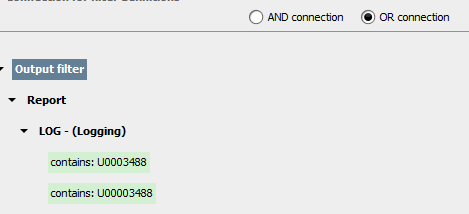
|
NAT |

Knowledge Base |
External Error Codes |

|
The following pages contain detailed information on the impact of the change of message number digits introduced in Automation Engine v10.0.5 and the available solutions or workarounds.
The length of message numbers has changed with Version 11.1 from 7 to 8 digits.
For example:
V10.0: U0003488 Server 'WP' was started as instance '1'.
V11.1: U00003488 Server 'WP' was started as instance '1'.
The change was introduced with an enhancement to enable an independent release cycle for API.
The enhancement deals with custom contents which is presumably not developed by Automic. Such objects contain messages and captions.
All language dependent texts (messages and captions) are maintained at a central location.
In order to be able to distinguish between custom and Automic messages and captions the number of digits was increased to 8.
|
No. |
What |
Solution |
||||||||||||||||||||||||
|---|---|---|---|---|---|---|---|---|---|---|---|---|---|---|---|---|---|---|---|---|---|---|---|---|---|---|
|
1 |
Filter objects Filter objects are intended to scan for string patterns and might break.
|
Filter objects must be adapted. The objects can be found by simply searching them with the GUI search feature or
select OH_Client, OH_Name, OFC_SrcName, OFC_FilterText The SQL above queries exactly for the pattern "Unnnnnnn". If there are other patterns such as "Unn*", the query Example result of the query:
The query found the filter object shown left. |
||||||||||||||||||||||||
|
2 |
Pre-Process/Process/Post-Process tabs of executable objects: :SET &hnd = PREP_PROCESS_REPORT(,,ACT)
|
The script on the left contains an STR_FIND() function to find a message number with pattern "Unnnnnnn". To find all scripts with the same pattern, the following SQL can be used: select OH_Client, OH_Name, OT_Lnr, OT_Content The SQL above queries exactly for the pattern "Unnnnnnn". If there are other patterns such as "Unn*", the query Example result of the query:
The query found the object shown on the left.
|
||||||||||||||||||||||||
|
3 |
Custom Application Programs |
Custom application programs, which parse log files of Automic components, must be adopted. |
||||||||||||||||||||||||
|
4 |
Call API for SAP ABAP call function 'UC4' destination 'UC4DSP' o_msg would contain "Unnnnnnnn ..." (new format) |
If an ABAP program uses the call API, they must be checked on how they deal with the returned string. |
||||||||||||||||||||||||
|
5 |
Call API for Java String msg = uc4.activateScript(":stop msg,50,\"Hello World\""); Output: U00000050 Hello World (new format) |
If such client programs are in place, they must be checked on how they deal with the returned string. |
Be aware that to change everything to the new message format "Unnnnnnnn" requires all components to be from Version 11.1.
Although the old message format and the new message format never can be mixed within one report or within one log file, it might happen that old components are in place and create output in the former format.
Example:
Running an SAP agent V10 against Automation Engine V11.1 would cause 2 different logs:
| Activation Log (NEW format - created from the Engine) |
|---|
| 2015-08-19 10:42:29 - U00020206 Variable 'LINK#' was stored with value 'http://www.uc4.com'. |
| Agent Log (OLD format - created from the agent) |
|---|
|
2015-08-19 10:42:29 - U2000005 Job 'JOBS.SAP.01' with RunID '5124035' started. |
Hence in such cases please consider the following procedures:
If old and new versions are in place at the same time, the sripts/filters need to be changed, so that they distinguish between versions of the data source.

Scripts can distinguish between agent versions thus:
select oh_name, host_htyp_hw, host_htyp_sw, host_hostAttrType, host_version, host_hostroles from oh, host
where oh_otype = 'HOST'
and oh_deleteflag = 0
and oh_idnr = host_oh_idnr
:SET &hnd# = PREP_PROCESS_VAR('VARA.SQLI.HOST')
:PROCESS &hnd#
: SET &host#=GET_PROCESS_LINE(&hnd#,1)
: SET &version#=GET_PROCESS_LINE(&hnd#,6)
: PUT_VAR'VARA.STATIC.HOST',&host#,&version#
:ENDPROCESS
:SET &hostname# = GET_ATT('HOST')
:SET &version# = GET_VAR('VARA.STATIC.HOST','&hostname#')
:IF &version# = ' '
:...